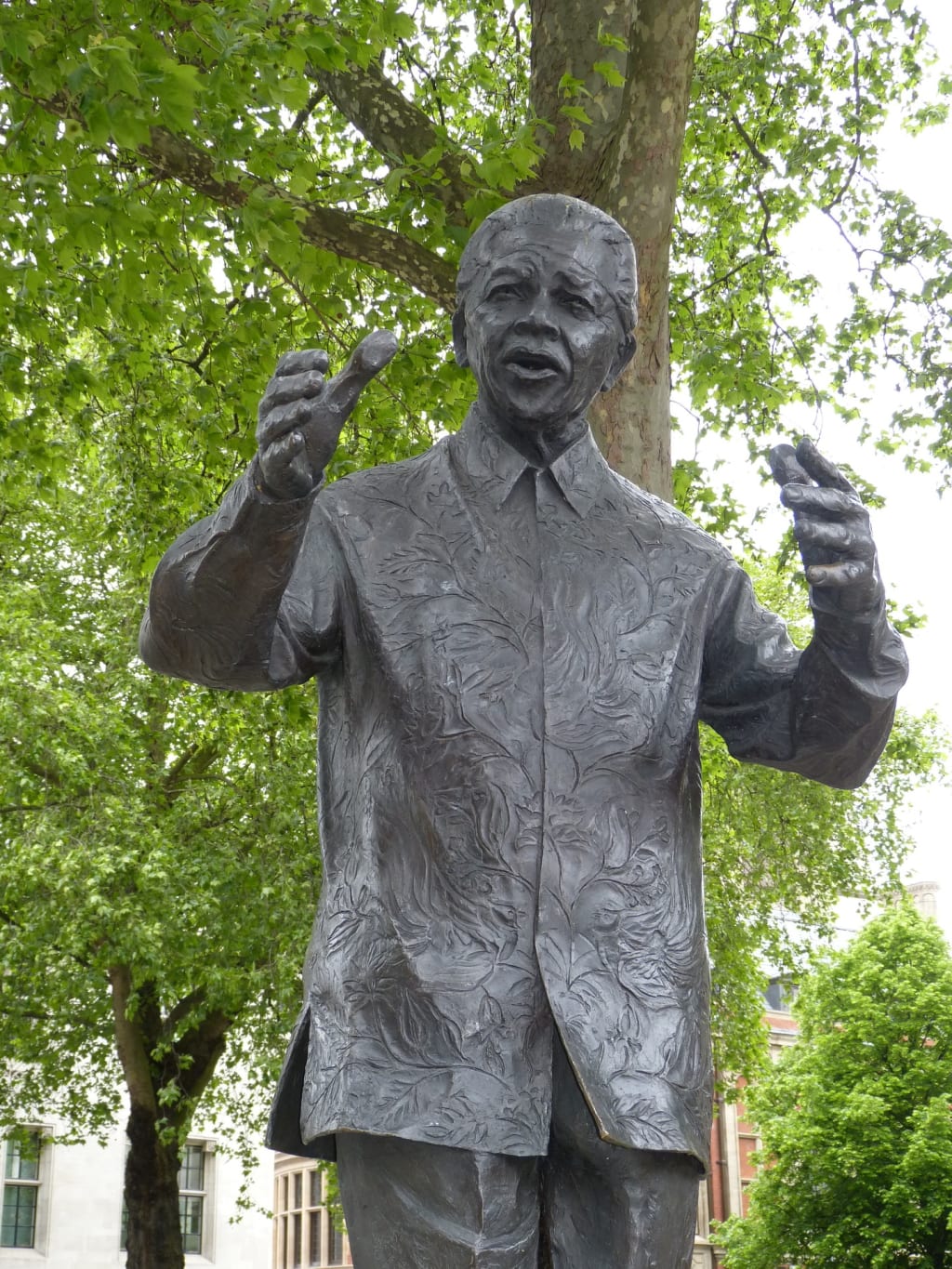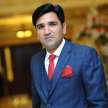18 July - Nelson Mandela International Day
Nelson Mandela's Life and Times

Rolihlahla Mandela was born on July 18, 1918, into the Madiba clan in the Eastern Cape town of Mvezo. Nonqaphi Nosekeni was his mother, while his father, Nkosi Mphakanyiswa Gadla Mandela, was the senior counsellor to the Acting King of the Thembu people, Jongintaba Dalindyebo. When Rolihlahla was 12 years old, his father died, and he became a ward of Jongintaba at the Great Place in Mqhekezweni.
Hearing the elders' accounts of his ancestors' courage throughout the resistance wars, he wished to contribute to his people's independence struggle.
Mandela Video Overlay:
He attended primary school in Qunu, where his teacher, Miss Mdingane, gave him the name Nelson, as was the usual for all kids to be given "Christian" names.
He completed his Junior Certificate at Clarkebury Boarding Institute before matriculating at Healdtown, a reputable Wesleyan secondary school.
Mandela began his studies for a Bachelor of Arts degree at the University College of Fort Hare but was expelled for participating in a student protest.
When he returned to the Great Place at Mqhekezweni, the King was enraged and threatened to arrange spouses for him and his cousin Justice if he did not return to Fort Hare. Instead, they fled to Johannesburg, where they arrived in 1941. He worked as a mine security officer there and was introduced to Lazer Sidelsky after meeting Walter Sisulu, an estate agent. He then completed his articles with the law firm of Witkin, Eidelman, and Sidelsky.
He received his BA from the University of South Africa and graduated from Fort Hare in 1943.
Meanwhile, he enrolled at the University of the Witwatersrand to pursue an LLB. According to his own admission, he was a poor student who dropped out of university in 1952 without graduating. After his release from prison in 1962, he resumed his studies at the University of London, although he did not complete his degree.
In 1989, during his final months in prison, he earned an LLB from the University of South Africa. He received his diploma in absentia at a ceremony in Cape Town.
Involved in politics since 1942, Mandela only joined the African National Congress in 1944, when he helped establish the ANC Youth League (ANCYL).
He arrived Walter Sisulu's cousin, Evelyn Mase, a nurse, in 1944. They had two sons, Madiba Thembi "Thembi" and Makgatho, and two daughters, both named Makaziwe, the first of whom died when she was a baby. In 1958, he and his wife divorced.
Mandela climbed through the ranks of the ANCYL, and the ANC adopted a more radical mass-based programmed, the Programmed of Action, in 1949, as a result of its activities.
He was appointed National Volunteer-in-Chief of the Defiance Campaign in 1952, with Maulvi Cachalia as his deputy. The ANC and the South African Indian Congress collaborated on this civil disobedience campaign against six unfair laws. For their roles in the campaign, he and 19 others were charged under the Suppression of Communism Act and condemned to nine months of hard labor, suspended for two years.
Mandela was able to practice law after completing a two-year law diploma on top of his BA, and in August 1952 he and Oliver Tambo founded Mandela & Tambo, South Africa's first black-owned law company in the 1950s. He was banned for the first time at the end of 1952. when a restricted individual, he could only witness in secret when the Freedom Charter was adopted in Kliptown on June 26, 1955.
The Treason Case:
On 5 December 1956, Mandela was apprehended in a nationwide police raid, resulting in the 1956 Treason Trial. Men and women of all races were in the dock during the long trial, which ended on March 29, 1961, when the final 28 accused, including Mandela, were acquitted.
On March 21, 1960, police killed 69 unarmed individuals during a protest against the pass laws in Sharpeville. On April 8, the country declared its first state of emergency and banned the ANC and the Pan Africanist Congress (PAC). Thousands of people were detained during the state of emergency, including Mandela and his comrades in the Treason Trial.
During the trial, Mandela married Winnie Madikizela, a social worker, on June 14, 1958. Zenani and Zindziswa were their two daughters. In 1996, the couple divorced.
Days before the conclusion of the Treason Trial, Mandela travelled to Pietermaritzburg to speak at the All-in-Africa Conference, which resolved that he should write to Prime Minister Verwoerd requesting a national convention on a non-racial constitution and warning that if he did not agree, there would be a national strike against South Africa becoming a republic. Following his and his colleagues' acquittal in the Treason Trial, Mandela went underground and began organizing a national strike for March 29, 30, and 31.
The strike was called off early due to heavy mobilisation of state security. In June 1961, he was asked to head the armed struggle and helped to form Umkhonto weSizwe (Spear of the Nation), which began with a series of explosions on December 16, 1961.
Mandela surreptitiously departed South Africa on 11 January 1962, under the adopted name David Motsamayi. He toured throughout Africa and to England in order to seek support for the armed campaign. In July 1962, he returned to South Africa after receiving military training in Morocco and Ethiopia. On 5 August, he was arrested at a police roadblock outside Howick while returning from KwaZulu-Natal, where he briefed ANC President Chief Albert Luthuli on his trip.
He was charged with illegally leaving the country and inciting workers to strike. He was found guilty and sentenced to five years in prison, which he began at the Pretoria Local Prison. He was sent to Robben Island on May 27, 1963, and returned to Pretoria on June 12, 1963. Within a month, police stormed Liliesleaf, a covert hideout used by ANC and Communist Party militants in Rivonia, Johannesburg, and detained several of his friends.
On October 9, 1963, Mandela and ten others were charged with sabotage in what became known as the Rivonia Trial. On 20 April 1964, while facing the death penalty, his statements to the court at the close of his famous "Speech from the Dock" became immortalized.
On June 11, 1964, Mandela and seven other defendants, including Walter Sisulu, Ahmed Kathrada, Govan Mbeki, Raymond Mhlaba, Denis Goldberg, Elias Motsoaledi, and Andrew Mlangeni, were found guilty and sentenced to life in prison. Because he was white, Goldberg was transported to Pretoria Prison, while the others were transferred to Robben Island.
Mandela's mother passed away in 1968, and his eldest son, Thembi, passed away in 1969. He was barred from attending their funerals.
Mandela was moved to Pollsmoor Prison in Cape Town with Sisulu, Mhlaba, and Mlangeni on March 31, 1982. In October, Kathrada joined them. Mandela was imprisoned alone when he returned to the prison in November 1985 following prostate surgery. Justice Minister Kobie Coetsee paid him a visit in the hospital. Later, Mandela began discussions regarding a last meeting between the apartheid authorities and the ANC.
Prisoner release:
On August 12, 1988, he was taken to the hospital and diagnosed with tuberculosis. After spending more than three months in two hospitals, he was transported on December 7, 1988, to a house at Victor Verster Prison outside Paarl, where he spent the remainder of his 14-month sentence. He was released from its confines on Sunday, February 11, 1990, nine days after the ANC and the PAC were unbanned and nearly four months after his surviving Rivonia companions were released. Throughout his imprisonment, he had turned down at least three conditional release offers.
Mandela became involved in official negotiations to remove white minority rule and was chosen ANC President in 1991 to replace his sick buddy, Oliver Tambo. He and President FW de Klerk shared the Nobel Peace Prize in 1993, and on April 27, 1994, he voted for the first time in his life.
President:
He was inaugurated as South Africa's first democratically elected President on May 10, 1994. In 1998, on his 80th birthday, he married Graça Machel, his third wife.
Mandela fulfilled his commitment by stepping down in 1999 after serving only one term as President. He worked with the Nelson Mandela Children's Fund he established in 1995, as well as the Nelson Mandela Foundation and The Mandela Rhodes Foundation.
"It is in your hands" - Mandela Day quote
Mandla Mandela, his grandson, was installed as the head of the Mvezo Traditional Council in an April 2007 ceremony in the Mvezo Great Place.
Nelson Mandela's commitment to democracy, equality, and education was unwavering. Despite horrendous provocation, he never responded to racism with racism. His life serves as an inspiration to those who are oppressed and disadvantaged, as well as those who reject injustice and hardship.
On December 5, 2013, he died at home in Johannesburg.
1. Nelson Mandela's father died when he was 12 years old, and his mother died when he was in prison in 1968. While his father died when he was nine, according to his memoirs Long Walk to Freedom, historical evidence indicates that it was much later, most likely in 1930. Indeed, the original Long Walk to Freedom document (written on Robben Island) claims that he was 12 years old in 1930.
2. proved the existence of at least two more black-owned law businesses prior to Mandela and Tambo.






Comments (1)
this is very good i liked it